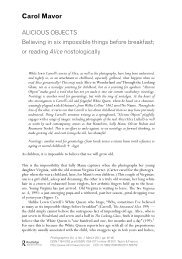View PDF - Esther Teichmann
View PDF - Esther Teichmann
View PDF - Esther Teichmann
Create successful ePaper yourself
Turn your PDF publications into a flip-book with our unique Google optimized e-Paper software.
Biographies:<br />
German/American artist<br />
<strong>Esther</strong> <strong>Teichmann</strong> was born<br />
in Germany in 1980 and<br />
moved to Britain in 1998.<br />
She received a Masters of<br />
Fine Art from the Royal<br />
College of Art in 2005, and<br />
continues to live and work in<br />
London. <strong>Teichmann</strong>’s work<br />
has been internationally<br />
shown and published.<br />
She was listed among Art<br />
Review’s top 25 new artists<br />
in 2005 and her work has<br />
been featured in Camera<br />
Austria, Capricious, Creative<br />
Review, Dazed&Confused,<br />
Hotshoe, i-D, V&A Magazine<br />
and Wallpaper amongst<br />
others. <strong>Teichmann</strong> is<br />
currently an MPhil/PhD by<br />
practice student in the fine<br />
art department at the Royal<br />
College of Art.<br />
Carol Mavor is the author<br />
of three books: Reading<br />
Boyishly: Roland Barthes,<br />
J. M. Barrie, Jacques Henri<br />
Lartigue, Marcel Proust, and<br />
D.W. Winnicott; Becoming: The<br />
Photographs of Clementina,<br />
Viscountess Hawarden and<br />
Pleasures Taken: Performances<br />
of Sexuality and Loss in<br />
Victorian Photographs, all<br />
published by Duke University<br />
Press. Her work has been<br />
widely acknowledged and<br />
reviewed including by the<br />
New Yorker, the Times<br />
Literary Supplement and The<br />
Village Voice. Currently, she is<br />
finishing a novel entitled Full,<br />
and a slim film book entitled<br />
Black and Blue.<br />
Notes:<br />
1. Roland Barthes,<br />
A Lover’s Discourse:<br />
Fragments, trans. Richard<br />
Howard (New York: Hill and<br />
Wang, 1978), p.48. In French<br />
as Fragments d’un discours<br />
amoureux (Paris: Éditions<br />
du Seuil), p.60.<br />
2. Barthes, A Lover’s<br />
Discourse, p.48. In French:<br />
Fragments d’un discours<br />
amoureux, p.59.<br />
3. Roland Barthes,<br />
Camera Lucida: Reflections<br />
on Photography, trans.<br />
Richard Howard (New York:<br />
Farrar, Straus and Giroux,<br />
1981), p.96. In French: La<br />
Chambre claire: Note sur la<br />
photographie (Paris:<br />
Gallimard, 1980), p.150.<br />
4. D. W. Winnicott,<br />
‘Further Thoughts on Babies<br />
as Persons’ in The Child, the<br />
Family, and the Outside World<br />
(Harmondsworth: Penguin<br />
Books, 1964), p.88.<br />
5. Julia Kristeva,<br />
‘Motherhood According to<br />
Bellini’ in Desire in Language:<br />
A Semiotic Approach to<br />
Literature and Art, edited by<br />
Léon Roudiez, translated by<br />
Alice Jardine, Thomas Gora<br />
and Léon Roudiez (New York:<br />
Columbia University Press,<br />
1980), p.240. Originally<br />
published in French as<br />
‘Maternité selon Giovanni<br />
Bellini’ in Polylogue (Paris:<br />
Seuil, 1977).<br />
6. Winnicott, ‘Transitional<br />
Objects and Transitional<br />
Phenomena’ in Playing and<br />
Reality (London: Tavistock,<br />
1970; reprint, London:<br />
Routledge, 1991), p.11.<br />
7. Winnicott, ‘Mirror-role<br />
of Mother and Family in Child<br />
Development’ in Playing and<br />
Reality, p.111.<br />
8. Winnicott, ‘Mirror-role<br />
of Mother and Family in Child<br />
Development’ in Playing and<br />
Reality, p.118.<br />
9. Sigmund Freud, Beyond<br />
the Pleasure Principle,<br />
translated and edited by<br />
James Strachey (New York<br />
and London: W. W. Norton<br />
& Company, 1961), p.13–15.<br />
10. Winnicott,<br />
‘Transitional Objects and<br />
Transitional Phenomena’<br />
in Playing and Reality, p.12.<br />
11. Barthes, Camera<br />
Lucida, p.38. In French: La<br />
Chambre claire, p.66.<br />
12. Marcel Proust, Swann’s<br />
Way, Vol. I of In Search of Lost<br />
Time, translated by C.K. Scott<br />
Moncrieff and Terence<br />
Kilmartin, revised by D. J.<br />
Enright (New York: Random<br />
House, 1992), p.64.<br />
13. Barthes, Camera<br />
Lucida, 40. In French: La<br />
Chambre claire, p.68.<br />
14. Barthes, Camera<br />
Lucida, 7. In French: La<br />
Chambre claire, p.20.<br />
15. Barthes, Camera<br />
Lucida, 39. In French: La<br />
Chambre claire, p.67.<br />
16. Charles Baudelaire,<br />
The Flowers of Evil in French<br />
and English, translated by<br />
James McGowan with an<br />
introduction by Jonathan<br />
Culler (New York: Oxford<br />
University Press, 1998),<br />
p.30–31.<br />
17. Barthes, Camera<br />
Lucida, 40. In French: La<br />
Chambre claire, p.68.<br />
18. Winnicott, Home is<br />
Where We Start From<br />
(New York: W.W. Norton<br />
& Company, 1986).<br />
19. Carol Mavor, ‘Roland<br />
Barthes’s Umbilical Referent’,<br />
in Richard Meyer, editor,<br />
Representing the Passions:<br />
Histories, Bodies, Visions<br />
(Santa Monica, California:<br />
Getty Research Institute,<br />
2003). Also, Reading Boyishly:<br />
J. M. Barrie, Roland Barthes,<br />
Jacques Henri Lartigue, Marcel<br />
Proust and D. W. Winnicott<br />
(Durham and London: Duke<br />
University Press, 2006).<br />
20. Barthes, Camera<br />
Lucida, 43. In French: La<br />
Chambre claire, p.74. Richard<br />
Howard has translated ‘ô<br />
négresse nourricière’ as ‘the<br />
“solacing Mammy”’, with the<br />
careful addition of quotation<br />
marks around his all-out bang<br />
of ‘solacing Mammy’,<br />
suggesting his own bafflement<br />
of how to name the darkness<br />
of race as inflected by ‘ô<br />
négresse nourricière’.<br />
21. Barthes, Camera<br />
Lucida, 27. In French: La<br />
Chambre claire, p.49.<br />
22. See for example his<br />
book Welcome to the Jungle:<br />
New Positions in Black Cultural<br />
Studies (New York and<br />
London: Routledge, 1994).<br />
23. Hélène Cixous,<br />
‘Sorties: Out and Out:<br />
Attacks/Ways Out/Forays’, in<br />
Hélène Cixous and Catherine<br />
Clément, The Newly Born<br />
Woman, translated by Betsy<br />
Wing (Minneapolis:<br />
University of Minnesota Press,<br />
1986), p.87. Originally<br />
published in French as<br />
‘Sorties’ in Hélène Cixous and<br />
Catherine Clément, La Jeune<br />
née (Paris: Union d’Éditions<br />
Générales, 1975).<br />
Fig. 1. Alessio Baldovinetti,<br />
Madonna and Child, 1465<br />
copyright 1999. Photo Musèe<br />
Jacquemart-Andrè/ Inst. de<br />
France/ Scala, Florence



